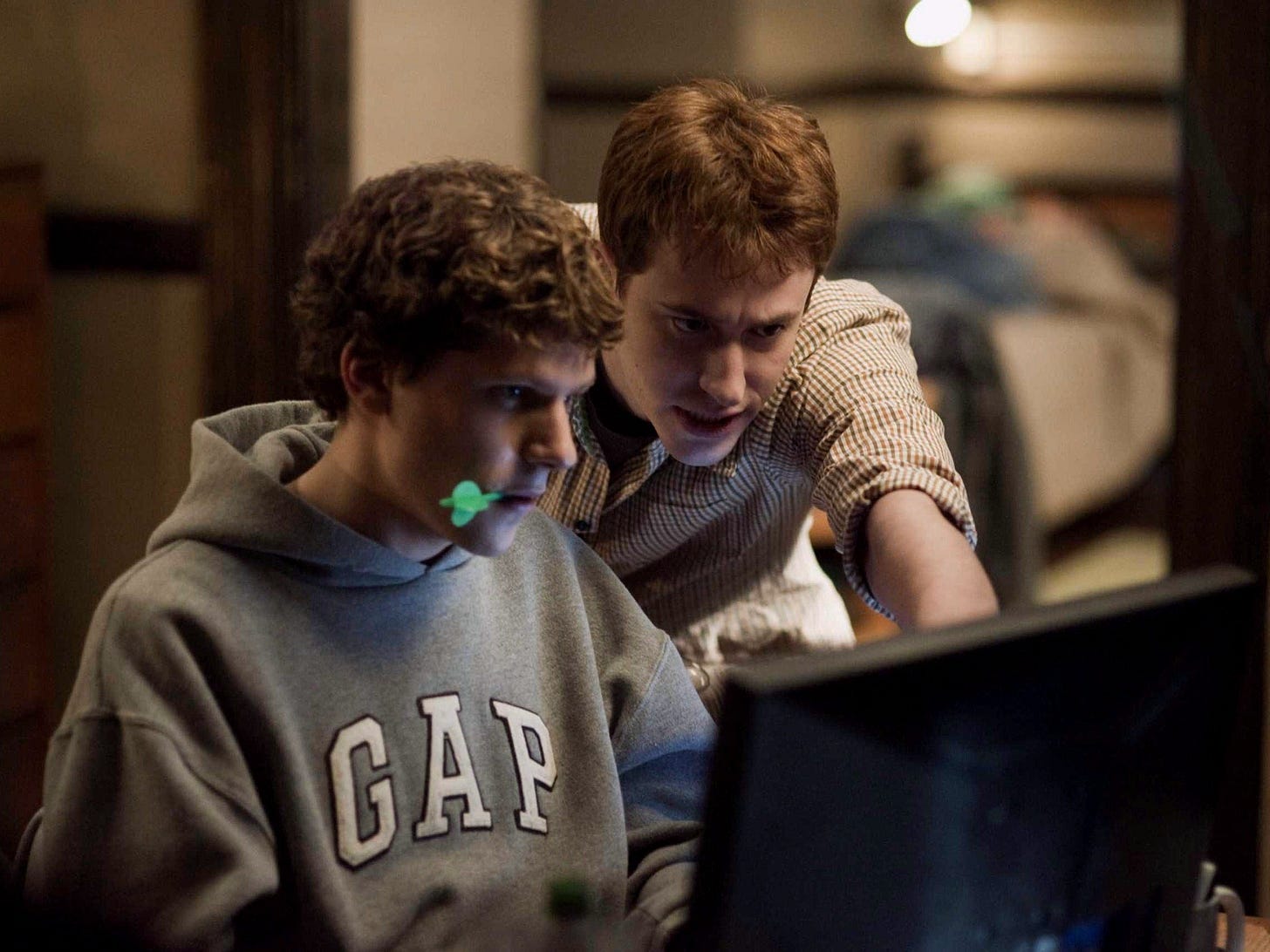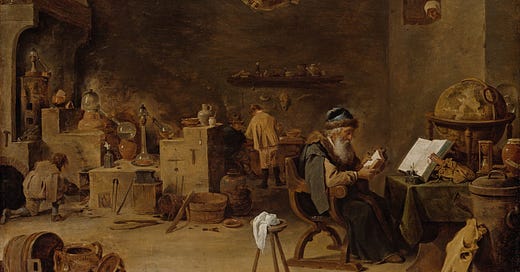Modern Alchemy: Why We Love Building Social Software
Social was hot. Then it was dead. Now it's hot again. As builders, why do we keep coming back?

This guy was working on a photo sharing app.
I say this as someone who has tried, over and over, to create the next great social product: Building a blockbuster social app is a little like performing alchemy. Think about it.
It's insanely difficult (OK, actually impossible, in the case of alchemy)
It's very lucrative
It has a magical allure (What this blog post is about!)
And I promise I'm not just mythologizing this considerable task because I haven't done it. (Yet.)
“Insanely Difficult”
Let's count just a few of the ways that building a successful social product is insanely difficult:

There aren't really any modest successes in social. It's a true winner-take-all business. You're hitting a home run or striking out.
As a builder, you're constantly aging away from your target demo. (Unless you're 13 years old, in which case, respect.)
The chicken-and-egg problem. (i.e. user downloads the app, has no friends there, and promptly deletes the app.)
It's hard to know what will resonate with people, whether it’s an app or a song. (Think: Lil Nas X putting out “Old Town Road.” Yup, he was super savvy about distribution, but really, couldn’t have predicted what would happen next.) You can boil the practice down to a science as much as you'd like to, but there *is* a maddening and wonderful element of randomness to making a hit.
(Would love to hear others' suggestions for this list, btw. I know I'm missing some big ones. I generally try not to dwell on the difficulties...)
These problems aren't all exclusive to building for social. The chicken-and-egg thing is a classic problem with marketplaces, for example. But considered together, they present a unique challenge.
I once heard someone say that building a social app is like trying to convince people who are already having a great time at a big house party (think Instagram, Snap, Twitter, and yes, Houseparty, lol) to come over to another (nearly empty) place — and to invite their friends to do the same.
Like I said: insanely difficult.
“Very Lucrative”
News, to absolutely no one: You can get super rich building social software. It's a cliche for a reason.

Here are a few of the big deals that went down (or came close) during the first social boom:
MySpace went to News Corp for $580 million in 2005
Facebook got a $1 billion offer from Yahoo in 2006
Instagram sold to Facebook for $1 billion in 2012
Vine sold to Twitter for $100 million pre-launch in 2012
Snapchat turned down a $3 billion offer from Facebook in 2013
If you're able to engage many people in a high-frequency behavior online, you're going to make money. Duh. What was striking about these offers, though, is that they came so soon after the company was formed. The idea wasn’t just that you could get rich — it was that you could get rich fast.
*That said, while many of these stories look like overnight successes, the product that actually "won" may have been the 9th attempt by that founding team. Consider Burbn, Facemash, FutureFreshman, etc. (But still. Lucrative.)
“Magical Allure”
This is what the rest of the blog post is about. Not how difficult social products are to build (maybe a good topic for another time) nor how lucrative they can be (how boring) but that unknowable, magnetic property that captivates builders.

Maybe "The Social Network," which came out in 2010, made it look glamorous. How could it not? The pulsing Trent Reznor beats. Aaron Sorkin's whiplash dialogue. An exciting, Harvard-set American success story. A product the whole country was addicted to. No wonder the movie is still part of our collective psyche. (If you guys were the inventors of Facebook, you'd have invented Facebook.)
When the film premiered and inspired posers pitched Instagram clones, I remember VC-types musing that the movie began the decline of social as a red-hot sector in tech. Makes sense...and seems to kinda track. (Off topic: "The Social Network" should've won Best Picture at the Oscars a few months later. Robbed. Anyway.)
But I was building in social pre- and post- "The Social Network." For me, it wasn't and isn't the surface-level sparkle that made social a tantalizing endeavor. There was something more creative to it. James Currier might've touched on it here:
These types of software products are the most artistic corner of the tech world. Like movies and music, the subtle details matter. Facebook, for instance, was perhaps the 40th social network built with essentially the same 5 features but emerged as the titan through a series of subtle differences, some lucky, but most due to talent.
"The most artistic corner of the tech world." Jokes about Silicon Valley's lack of artistic taste aside, I think that rings true. Think about it: You're designing a space for people to spend a ton of time in and engage with. Your product, if it works, will be used by all your friends 20x per day. You're trying to wedge into people's everyday lives. It's kind of the ultimate creative pursuit.
Your buddies can’t fake support for that — not past a few days TestFlight'ing, at least. If one of your friends starts selling hats on an e-commerce store, you can buy one to support her. But there's no pretending that you love a social app. You're in or you're out. It becomes part of your routine, or it doesn't. What an invigorating challenge for a builder.
You have to be a multi-disciplinary thinker, too. Social sits at the intersection of communication, identity, culture, tech, design, psychology, media, gaming, and even architecture. You have to live in many different worlds to create something new that eats away at the time people are already spending on Instagram, Snapchat, and so on. You need to have your finger on the pulse of the world.
In other words, you’re making something that’s absolutely core to the human experience, in so many ways.
If I sound like I'm searching, it's because I am. I've never heard anyone discuss *why* building social products is a compelling exercise in and of itself. Writing this is my stab at the question.
I reached out to a handful of people I respect who have built products in social, and asked them what it is about this space that calls to them.
Here are their answers:
@hipcityreg
I think at the core, I’m fascinated with questions of identity. And social provides an incredibly unique context to build around self, community, crowds, media, medium... the list goes on.
It’s perhaps the most intersectional software — and there’s very little rules around what it can be. It’s truly a playground. When designing social technologies I’m forced to evaluate my relationship with the world. My values. How I think it all comes together. Then isolate a slice that I believe is universal, and embody this in some way.
Social technologies are so flexible. Out cities and companies are social technologies. Our homes are social technologies. I will always build in this space — or at minimum consumer — because it is a question ever evolving.
@vidythatte
As a kid, I wanted to be a musician really bad, mainly because musicians have such a huge impact on our culture. This is why consumer tech is attractive to me, it has the potential to impact and create culture like music does. Products like Instagram, Tesla, Uber, Snapchat and Twitter are all part of mainstream culture in such a fundamental way. That's more exciting than just making money.
@esthercrawford
I’ve devoted my entire career to social products because the early social web changed my life.
I grew up in a cult where we weren’t allowed to do a lot of normal teenage activities like go to movies or concerts. So I got online instead, which surprisingly wasn’t banned — even though TV was.
I found my way into chatrooms where I met people who had totally different beliefs and ideas — and those friendships sparked a curiosity about the rest of the world that I couldn't ignore.
Ultimately I chose to strike out on my own and go to a secular university, which was very frowned upon, especially for a girl. I left the religion when I was 18 and just kept leaning into online communities for friendship and connection.
I was an early blogger on Xanga and an early vlogger on YouTube. I didn’t initially set out to build social products, it’s just I kept spending all my free time on them. After spending so long as an early adopter and content creator I decided to move to San Francisco to get closer to product and figure out how to work for and then build my own.
Social products bring me joy. I believe they’re a powerful architecture that subtly moves culture and society — and I want to be part of building the change I want to see happen in the world.
I experienced a lot of loneliness as a kid, so, I’m drawn toward the space that has a chance of solving that for people.
I think this is the highest leverage thing I can do with my life, so it’s more like an obsession than a job at this point.
@micalejohn_
I'm working in this space because I believe that self-expression and connection are fundamental to the human condition — we all deserve better digital-social spaces that empower and fulfill. I'm especially interested in how youth use social and creation tools; as an educator I've seen firsthand how they use them to build their identities, collaborate with friends and discover their world, and I love exploring that experience.
@nikitabier
I like seeing something I made from my computer take over the internet overnight.
Thanks for reading. Are you building in social? Connect with me on Twitter @adamokane!



